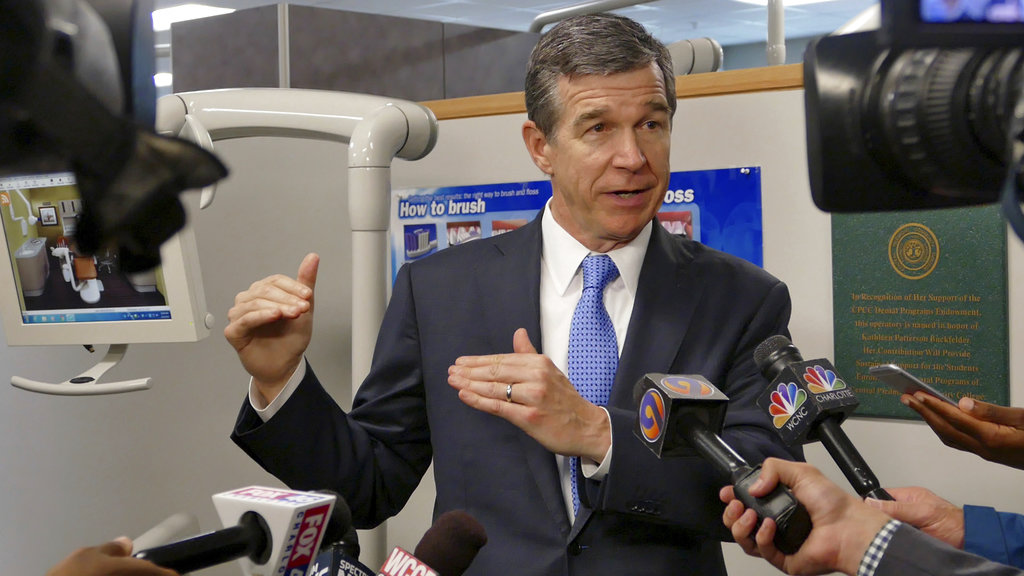Paul O’Connor: Veto vote haunts Cooper
Published 12:00 am Thursday, July 6, 2017

- Gov. Roy Cooper AP photo
RALEIGH — It can be fun to see how decisions made one day can come back to bite you a bit later.
For example, think of how often a professional athlete, after being traded away, has returned to beat his old team.
In North Carolina politics last week, we just saw such a butt biting, when the legislature overrode Gov. Roy Cooper’s veto of the budget.
The Senate vote was 34-14, or two-thirds. The House override vote was 76-43, a bit less than two-thirds, about 64 percent.
Had Republicans had their way in the early 1990s, when they were pushing for a constitutional amendment creating a gubernatorial veto, then last week’s vote would have failed to override Cooper’s veto. The original Republican veto proposal would have required a two-thirds vote in each house to override, as is the case in the U.S. Congress.
That GOP stance made political sense at the time. In 1972, 1984 and 1988, Republicans had won the governor’s mansion. But they hadn’t completely controlled the legislature in the 20th century, only the House in 1994. So, Republicans incorrectly guessed that they’d win the governorship again before winning total legislative control.
Legislative Democrats, on the other hand, didn’t like the veto at all. The legislature under Democratic leadership had always had the hard power in state politics, and Democratic legislators didn’t cotton to surrendering any power to any governor of any party.
But popular Gov. Jim Martin, in his re-election campaign of 1988, had made a veto amendment a major issue that persisted for seven years. (“Give me strength,” Martin would say in exasperation at campaign rallies when speaking about Democratic legislative control.) The 1994 national and state Republican landslides forced Democrats to cave; the legislature approved the veto amendment on March 8, 1995 and it was ratified in the November 1996 election.
Senate Democrats, who maintained control in 1995, would only agree, however, to a weak veto, one that prohibited the veto of local bills and redistricting maps. Furthermore, the threshold for override was set at 60 percent of each chamber.
In 2011-12, Republicans overrode several of former Gov. Bev Perdue’s vetoes, but they needed the help of several Democrats. Once they redistricted, and won bigger majorities in the 2012 election, they didn’t need Democrats to override their own governor, Pat McCrory.
Part of the Democratic strategy in the 2014 election was to win enough seats to block overrides, and uphold vetoes. In such a situation, McCrory would be tied more closely to the GOP legislative agenda. McCrory was eventually tied to that agenda, anyhow, with HB 2.
It’s important to note, also, that Cooper couldn’t veto local bills this year — for example, the bill that banned Orange County impact fees. Cooper likely would have vetoed it and the override vote, once made a partisan issue, would have been tight if two-thirds were needed.
Democrats hope that once new legislative maps are drawn later this year they will pick up enough seats in 2018 to make Cooper’s future vetoes stand. Once the governor’s veto can be sustained, then the governor’s voice plays a part in what goes into bills and budgets.
None of these problems would exist for the Democrats, however, had their own Senate forefathers, in the 1990s, set two-thirds as the override and allowed the veto of redistricting bills — Perdue certainly would have vetoed the 2011 Republican maps — and local bills.
So, as Roy Cooper watches Republicans override his vetoes, he has only the Senate Democrats of the 1990s to blame.
Oh, wait a second, wasn’t Cooper one of those Senate Democrats?
Yes, he was.
Paul. T. O’Connor writes columns for Capitol Press Association.

